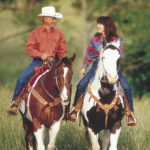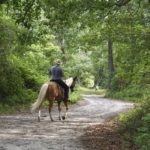I hear the question about a horse’s potential many times a year from customers who bring their horses to me for evaluation and possible training. Here, as a benefit to your own knowledge base, I’ll cover four key matters I consider when asked to make the initial assessment, and as training progresses.

Pedigree
Let?s say you were to call me about a horse you?d like to place with me for training as a reiner. My first question?s going to be, ?How’s your horse bred?? Reining talent comes from genetics, because it’s genetics that produce the conformation traits that allow a horse to stop, spin, roll back, and change leads with ease. Genetics also are largely responsible for a horse’s innate degree of trainability.
That’s not to say you get any guarantees, even with a solid reining pedigree, but it sure does up your chances.
If your prospect didn’t have parents that proved themselves capable of being reiners, his overall odds for success aren?t great.?He really stops great when he’s chasing dogs in the pasture? doesn’t count.
I won?t even look at a horse as a prospect for reining if he isn?t bred for the event?not because I’m a pedigree snob, but because I don’t think it’s fair to spend your money and my time on trying to force a square peg into a round hole. Chances are high that both you and I would be disappointed, and that your horse would be overchallenged, and frustrated.
Conformation
Assuming your horse is bred for reining, my next step would be to see him in person, to evaluate his conformation. Although some owners ask me to look at their prospects as yearlings, or even weanlings, I don’t think you can see a lot until a horse is at least 2 years old. Horses simply change too much as they?re adding their growth to that point.
I like to see a horse with big, intelligent-looking eyes, good-sized nostrils, a relaxed set of ears, and a short mouth. He should have a small, clean throatlatch for ease in flexing, and a neck that’s longer on top than on bottom, also good for flexing.
The curvature over the top of his neck contributes more to his flexing ability. He has an adequately sloped shoulder that ties in high, and isn?t so bulky in his front-end musculature that it limits his ability to turn around. I like a short back?a long-backed horse has a hard time collecting himself well enough to change leads.
Meaty stifles, and meaty hocks will tell me he’s well-muscled in those areas for the work that reining demands.
Ability
With any horse, proof of potential lies in his actual ability to perform the work he’s asked to do. I want to see a horse that’s giving readily to bit contact, and is relaxed and moving freely beneath the weight of his rider.Hindquarter conformation that includes well-muscled stifles and correctly aligned columns of rear-leg bones will make it possible for him to stride up deeply behind and push off. You won?t have to work and struggle to collect him, and he’ll deliver a smooth ride.
Watch the horse as he stops. He should be light on the reins, with good body balance and a rounded back, as he gets his butt in the ground. He shouldn?t appear to be straining, stiffening, or otherwise struggling to get stopped.
Heart
While pedigree and conformation analysis can tell you quite a lot about a horse’s potential as a reiner, there’s one key matter you can’t determine until you actually start riding and training him. That’s the matter of heart, or ?try.? Horses vary greatly when it comes to this, as it’s an individual thing.
Some have little to none of this quality, and others have a seemingly bottomless supply. The closer a horse is to the bottomless side of the spectrum, the better the performer he’ll turn out to be?in reining, or any other discipline.
Often, a horse with a lot of heart is able to compensate, at least to some degree, for less-than-ideal reining conformation .He?ll put up with the repetition and physical exertion that reining maneuvers require, and won?t rebel or quit you when training hits a difficult patch. He?ll try to find a way to please you, and even if his best isn?t as good as that of another horse, he’ll deliver it with consistency.
This is one reason why horse training is as much an art and a mystery as it is a science. It’s also why the more prospects you try, the more readily you’ll know heart in a horse when he has it?and why a horse that’s big on heart, and maybe not so big on reining ability, still has a purpose in this world.
Excerpted from ?Reining Potential,? Horse & Rider magazine.





